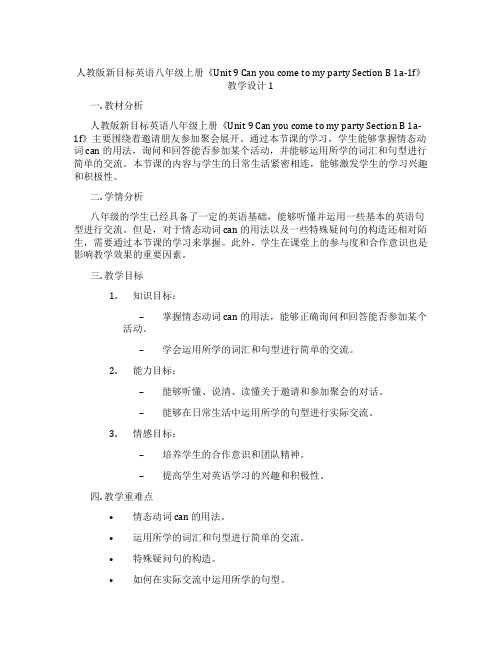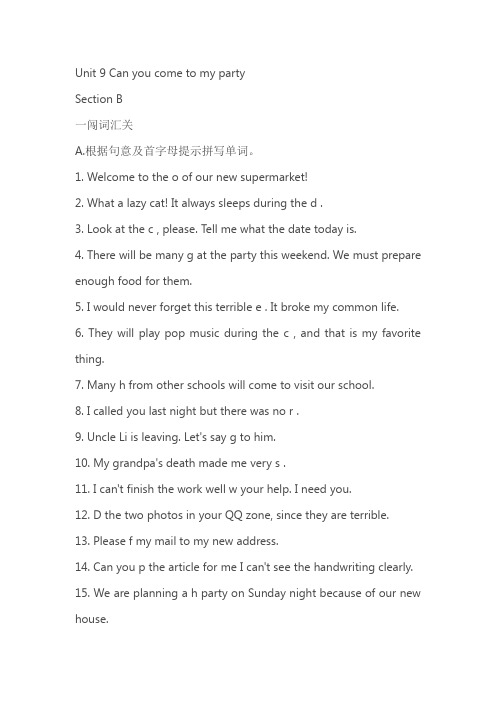人教八年级英语上册unit 9 can you come to my party (section a 1a-2c) (共44张)ppt课件
- 格式:ppt
- 大小:21.89 MB
- 文档页数:44


人教版新目标英语八年级上册《Unit 9 Can you come to my party Section B 1a-1f》教学设计1一. 教材分析人教版新目标英语八年级上册《Unit 9 Can you come to my party Section B 1a-1f》主要围绕着邀请朋友参加聚会展开。
通过本节课的学习,学生能够掌握情态动词 can 的用法,询问和回答能否参加某个活动,并能够运用所学的词汇和句型进行简单的交流。
本节课的内容与学生的日常生活紧密相连,能够激发学生的学习兴趣和积极性。
二. 学情分析八年级的学生已经具备了一定的英语基础,能够听懂并运用一些基本的英语句型进行交流。
但是,对于情态动词 can 的用法以及一些特殊疑问句的构造还相对陌生,需要通过本节课的学习来掌握。
此外,学生在课堂上的参与度和合作意识也是影响教学效果的重要因素。
三. 教学目标1.知识目标:–掌握情态动词 can 的用法,能够正确询问和回答能否参加某个活动。
–学会运用所学的词汇和句型进行简单的交流。
2.能力目标:–能够听懂、说清、读懂关于邀请和参加聚会的对话。
–能够在日常生活中运用所学的句型进行实际交流。
3.情感目标:–培养学生的合作意识和团队精神。
–提高学生对英语学习的兴趣和积极性。
四. 教学重难点•情态动词 can 的用法。
•运用所学的词汇和句型进行简单的交流。
•特殊疑问句的构造。
•如何在实际交流中运用所学的句型。
五. 教学方法1.任务型教学法:通过设置各种任务,引导学生积极参与课堂活动,提高学生的实际运用能力。
2.情境教学法:通过创设各种真实的社交场景,让学生在特定的情境中学习英语,提高学生的交际能力。
3.合作学习法:鼓励学生进行小组合作,培养学生的团队精神和合作能力。
六. 教学准备1.教材:人教版新目标英语八年级上册。
2.多媒体设备:电脑、投影仪、音响等。
3.教学课件:根据教学内容制作相应的课件。
4.教学素材:与本节课主题相关的图片、视频等。

Unit 9 Can you come to my partySection B一闯词汇关A.根据句意及首字母提示拼写单词。
1. Welcome to the o of our new supermarket!2. What a lazy cat! It always sleeps during the d .3. Look at the c , please. Tell me what the date today is.4. There will be many g at the party this weekend. We must prepare enough food for them.5. I would never forget this terrible e . It broke my common life.6. They will play pop music during the c , and that is my favorite thing.7. Many h from other schools will come to visit our school.8. I called you last night but there was no r .9. Uncle Li is leaving. Let's say g to him.10. My grandpa's death made me very s .11. I can't finish the work well w your help. I need you.12. D the two photos in your QQ zone, since they are terrible.13. Please f my mail to my new address.14. Can you p the article for me I can't see the handwriting clearly.15. We are planning a h party on Sunday night because of our new house.B.用所给词的适当形式完成句子。


人教版英语八年级上册Unit 9《Can you come to my party》教学设计一. 教材分析人教版英语八年级上册Unit 9主要讲述了关于邀请别人参加聚会的情境。
通过本单元的学习,学生能够掌握与聚会相关的词汇和表达方式,学会如何礼貌地邀请别人,并能够用英语进行简单的交流。
本单元的核心句型是“Can you come to my party?”,以及回答“Yes, I can.”和“No, I can’t.”。
二. 学情分析八年级的学生已经具备了一定的英语基础,能够听懂并运用简单的英语进行交流。
他们对学习英语有浓厚的兴趣,并且愿意积极参与课堂活动。
然而,部分学生可能在口语表达和听力方面还存在一定的困难,需要教师的引导和帮助。
三. 教学目标1.知识目标:学生能够掌握与聚会相关的词汇和表达方式,学会如何礼貌地邀请别人,并能够用英语进行简单的交流。
2.能力目标:学生能够听懂并运用核心句型“Can you come to my party?”进行交流,提高口语表达能力。
3.情感目标:学生能够在课堂上积极参与,培养合作意识和团队精神。
四. 教学重难点1.重点:学生能够听懂并运用核心句型“Can you come to my party?”进行交流。
2.难点:学生能够正确使用情态动词“can”来表达自己的能力。
五. 教学方法1.情境教学法:通过创设真实的聚会情境,激发学生的学习兴趣,提高他们的口语表达能力。
2.交际法:通过小组讨论和角色扮演等方式,培养学生的合作意识和团队精神。
3.任务型教学法:通过完成各种任务,引导学生主动参与学习过程,提高他们的自主学习能力。
六. 教学准备1.教学材料:教材、多媒体课件、录音机、磁带或音频文件。
2.教学环境:教室布置成聚会场景,悬挂气球、彩带等装饰物。
七. 教学过程1.导入(5分钟)教师以提问的方式引导学生回顾已学过的与聚会相关的词汇,如“birthday party”、“house party”等。

八年级上unit9 Can you come to my party?(含答案)一.单项选择1.—It’s too late. I have to go now. —Oh, it’s raining outside. Don’t leave________it stops.A. sinceB. untilC. while2. —Dad, must we wait until the light becomes green?—Yes, I’m afraid we________. That’s the traffic rule.A. canB. mayC. have toD. Need3. —Can you give us more examples? —OK, I’ll give you_______example now.A. otherB. the otherC. anotherD. others4 My family has two dogs. One is white, _____is black.A.otherB. anotherC. the otherD. others5.—Jenny, can you come to my birthday party on Sunday? —Sure, _______.A.I’d loveB. I can’tC. I’d love toD. I have to6.—Why are you so tired these days? —Well, I have_____work to do.A.too muchB. too manyC. much tooD. so many7.John didn’t go to bed______the football match on TV was over last night, so he was sleepy now.A.becauseB.untilC. ifD. but8.—Can you go shopping with me this afternoon, Linda?—_____. I must study for my English test.A.I hope soB. I’m afraid notC. SureD. I’d love to9.—Would you please see the film Iron Man3 with me tonight, Kate?—I’d love to, but I’ve_______Linda’s invitation to dinner.A.sufferedB. earnedC. receivedD. accepted10.H e may refuse______such a silly question.A.answerB. answeredC. answeringD. to answer11.T he speech contest will start_____2: 00pm______Friday afternoon.A. at; inB. at; onC. in; onD. at; at12. —What are you going to do this evening?—I’m not sure. I_____watch TV at home.A. mustB. have toC. mightD. should13. —______are you going to the mountains with on Sunday, Tom? —My friends.A. WhenB. WhatC. WhereD. Who14. —Jim,_______you go and play basketball with us now?—Sorry, I can’t. I have to clean my room at home.A. AreB. CanC. MustD. Do15. We have to_______ourselves when we are away from home.A. look atB. look forC. look upD. look after16. —I’m looking forward to_______my parents soon. What about you?—Me too.A. seeingB. seeC. sawD. to see17. I couldn’t do it________your great help. Thanks a lot!A. withB. withoutC. forD. to18 .One important aim of our school is to prepare us for the future_____ we can face all theA.so farB. so thatC. even ifD. if only19. Alice kept_______all day because she lost her favourite toy.A.gladB. sadC. surprisedD. tired20.We all know that fish can’t live_______water.A.withB. afterC. byD. without21.Jonson is looking forward to________the Great Wall next year.A.visitedB. visitC. visitsD. visiting22.The girl saved every coin_______she could buy her father a present on Father’s Day.A. ifB. in order toC. so thatD. because23. _______wonderful concert they are putting on in the movie theater!A. HowB. WhatC. What aD. What an24. I’ll invite all my friends_______my birthday party.A. withB. atC. inD. to25. The football match______on the evening of next Saturday in the city gym.A. wasB. willC. will beD. be26. —_______go for a picnic this weekend. —Good idea.A. Can youB. What aboutC. When do youD. Let’s27. The final exam is coming. I________try my best to study for it.A. mustB. mightC. needD. would28. The students are very ______ at the ______ news.A. surprised;surprisingB. surprising;surprisedC. surprised;surprisedD. surprising;surprising29. She spends ______ time (in) watching TV. It is bad for her eyes.A. much tooB. too manyC. too muchD. many too30. —Must I be home before nine o'clock, Mom?— No, you ________. But you have to come back before ten o'clock.A.needn't B.can't C.mustn't D. shouldn’t二.用所给词的适当形式填空1.Julia_______(have) to help her mother do the housework on weekends.2.Thanks a lot for_______(show) me around your school.3. —Are you free_______(hang) out with me this afternoon?—No, I’m not free. I might visit my grandparents.4.—Hi, Tim. When______you_______(finish) your homework? —About in half an hour.5. We’re______(plan) to play basketball after school.6. I’m glad that Vincent accepted the______(invite).7. All of us are making________(prepare) for the end-of-year party.8. I'm very sorry ______(hear)that you are ill.9. My cousin is looking forward to________(find) a good job soon.10. Ms. Yang went out of the room without__________(say) anything.11. Thanks for your ______ (prepare) for the party.12. I would love ______(make)friends with new students.13. —Can he go to the baseball game?—No,he can't.He has to ______(study)for a test.14. We ______(catch) some fish last Friday.三.先选词并用其适当形式填空A.catch, exam, flu, prepare, available1.The final_______is coming. All the students are working hard for it.2.Linda has to go to the doctor this afternoon because she has the________.3. Walk ahead, please. I’ll________you up soon.4. —Can you come over to my house this weekend? —Sorry, I’m not_______. I have to help my parents.5. —What are you busy doing now? —Well, I’m busy_______for the English party.B.weekday, what, look after, have, study1.We usually go to work on________and have a rest on weekends.2.He can’t play soccer with us this afternoon. He________a piano lesson.3.I can’t go shopping with you, Julie. I have to______for my Englis h exam.4.Julie’s mother is ill. She must________her in the hospital.5. —_______is today? —It’s Tuesday the12th.C. concert, guest, daytime, open, event1.I would like to invite you to the______of our new school.2.Nancy enjoys music. I bought her a ticket to the_______on her birthday.3.The hotel now opens to the____.4.People work in the______and sleep at night.5. The band usually plays for school______, such as School Day, School Music Festival and so on.四.按要求改写句子1. It’s twelve o’clock?(对画线部分提问)_____ ______ is it?2.I got a letter from my pen pal in Australia last night.(改为同义句)I ______ ________ my pen pal in Australia last night3.The meeting starts 10:00.(对画线部分提问)______ ______the party______?4.She has to go to see the doctor.(改为否定句)She ______ __________ to go to see the doctor.5.People in that town have to move to a new place.(改为一般疑问句)______ people in that town ______ ______ move to a new place?八年级上unit9 Can you come to my party?一.单项选择1-5.BCCCC 6-10.ABBDD 11-15.BCDBD 16-20.ABBBD21-25.DCCDC 26-30.DAACA二.用所给词的适当形式填空1.has2.showing3.to buy4.will finish5.planning6.invitation7.preparations8.to hear9.finding 10.saying 11.preparation12.to make 13.study 14.caught三.先选词并用其适当形式填空A. 1.exam 2.flu 3.catch 4.available 5.preparingB. 1.weekdays 2.has 3.study 4.look after 5.WhatC. 1.opening 2.concert 3.guests 4.daytime 5.events四.按要求改写句子1.What time2.heard,from3.When,does,start4.doesn’t,have5.Do,have,to。
人教版新目标英语八年级上册《Unit 9 Can you come to my party Section B 1a-1e》教学设计1一. 教材分析人教版新目标英语八年级上册《Unit 9 Can you come to my party Section B 1a-1e》主要讲述了邀请朋友参加聚会的情景。
本节课主要让学生掌握情态动词can的用法,能够用can提问和回答邀请,以及表达自己和他人的喜好。
通过本节课的学习,学生能够提高听力、口语、阅读和写作能力。
二. 学情分析八年级的学生已经具备一定的基础知识,对于情态动词have和do的用法有一定的了解。
但学生在实际应用中,尤其是在听力方面还需加强。
此外,学生对于西方的聚会文化可能了解不多,需要在教学中进行适当的引导和拓展。
三. 教学目标1.知识目标:学生能够掌握情态动词can的用法,能够用can提问和回答邀请,以及表达自己和他人的喜好。
2.能力目标:学生能够提高听力、口语、阅读和写作能力。
3.情感目标:通过本节课的学习,学生能够学会礼貌地邀请他人参加聚会,提高人际交往能力。
四. 教学重难点1.重点:学生能够掌握情态动词can的用法,能够用can提问和回答邀请,以及表达自己和他人的喜好。
2.难点:学生能够在实际情景中正确运用情态动词can,尤其是在听力方面。
五. 教学方法1.任务型教学法:通过设置各种真实的任务,让学生在完成任务的过程中运用所学知识。
2.交际法:通过模拟真实的交际情景,让学生在实际交流中提高口语能力。
3.视听法:利用多媒体教学资源,提高学生的听力能力。
六. 教学准备1.教师准备:备好相关教学材料,如PPT、听力材料、练习题等。
2.学生准备:预习本节课的内容,了解基本的聚会文化。
七. 教学过程1.导入(5分钟)教师通过提问方式引导学生回顾情态动词have和do的用法,为新课的学习做好铺垫。
2.呈现(5分钟)教师播放听力材料,让学生听懂并理解邀请他人参加聚会的情景。
人教新目标八年级上册英语《Unit 9 Can you come to my party?》Section B_教案3一. 教材分析人教新目标八年级上册英语《Unit 9 Can you come to my party?》Section B 主要围绕邀请朋友参加聚会展开。
本节课通过学习一般现在时的特殊疑问句及其回答,使学生能够运用所学知识进行实际交流。
本节课的内容与学生的生活紧密相连,有利于激发他们的学习兴趣和参与欲望。
二. 学情分析八年级的学生已经掌握了英语学习的基本语法和词汇,具备一定的听、说、读、写能力。
对于一般现在时的疑问句及其回答,大部分学生已经有所了解,但仍有部分学生掌握不牢固。
在导入环节,教师可以通过与学生互动,了解他们在生活中参加聚会的情景,以便更好地激发他们的学习兴趣。
三. 教学目标1.知识目标:学生能够掌握一般现在时的特殊疑问句及其回答;2.能力目标:学生能够在实际情景中运用所学知识进行交流;3.情感目标:培养学生热爱生活、积极参与社交活动的态度。
四. 教学重难点1.重点:一般现在时的特殊疑问句及其回答;2.难点:一般现在时在实际情景中的运用。
五. 教学方法采用任务型教学法、情景教学法和分组合作学习法,让学生在实际情景中感知、实践、运用语言知识,提高他们的听、说、读、写能力。
六. 教学准备1.教具:多媒体课件、黑板、粉笔;2.教材:人教新目标八年级上册英语《Unit 9 Can you come to myparty?》Section B;3.辅助材料:与本节课相关的生活场景图片、活动卡片等。
七. 教学过程1.导入(5分钟)教师通过提问学生:“Do you like parties? Why?”引导学生谈论聚会话题,激发他们的学习兴趣。
同时,教师板书课题《Can you come to my party?》,引入新课。
2.呈现(10分钟)教师利用多媒体课件展示一组聚会场景图片,引导学生观察并回答问题:“What are they doing? Can you come to my party?”学生根据图片内容和已学知识进行回答。